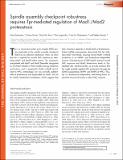| dc.contributor.author | Schweizer, Nina | |
| dc.contributor.author | Ferras, Cristina | |
| dc.contributor.author | Kern, David Matthew | |
| dc.contributor.author | Logarinho, Elsa | |
| dc.contributor.author | Maiato, Helder | |
| dc.contributor.author | Cheeseman, Iain M | |
| dc.date.accessioned | 2014-09-02T14:37:56Z | |
| dc.date.available | 2014-09-02T14:37:56Z | |
| dc.date.issued | 2013-12 | |
| dc.date.submitted | 2013-09 | |
| dc.identifier.issn | 0021-9525 | |
| dc.identifier.issn | 1540-8140 | |
| dc.identifier.uri | http://hdl.handle.net/1721.1/89126 | |
| dc.description.abstract | Tpr is a conserved nuclear pore complex (NPC) protein implicated in the spindle assembly checkpoint (SAC) by an unknown mechanism. Here, we show that Tpr is required for normal SAC response by stabilizing Mad1 and Mad2 before mitosis. Tpr coimmunoprecipitated with Mad1 and Mad2 (hereafter designated as Tpr/Mad1/Mad2 or TM2 complex) during interphase and mitosis, and is required for Mad1–c-Mad2 recruitment to NPCs. Interestingly, Tpr was normally undetectable at kinetochores and dispensable for Mad1, but not for Mad2, kinetochore localization, which suggests that SAC robustness depends on Mad2 levels at kinetochores. Protein half-life measurements demonstrate that Tpr stabilizes Mad1 and Mad2, ensuring normal Mad1–c-Mad2 production in an mRNA- and kinetochore-independent manner. Overexpression of GFP-Mad2 restored normal SAC response and Mad2 kinetochore levels in Tpr-depleted cells. Mechanistically, we provide evidence that Tpr might spatially regulate SAC proteostasis through the SUMO-isopeptidases SENP1 and SENP2 at NPCs. Thus, Tpr is a kinetochore-independent, rate-limiting factor required to mount and sustain a robust SAC response. | en_US |
| dc.language.iso | en_US | |
| dc.publisher | Rockefeller University Press | en_US |
| dc.relation.isversionof | http://dx.doi.org/10.1083/jcb.201309076 | en_US |
| dc.rights | Creative Commons Attribution-Noncommercial-Share Alike | en_US |
| dc.rights.uri | http://creativecommons.org/licenses/by-nc-sa/3.0/ | en_US |
| dc.source | Rockefeller University Press | en_US |
| dc.title | Spindle assembly checkpoint robustness requires Tpr-mediated regulation of Mad1/Mad2 proteostasis | en_US |
| dc.type | Article | en_US |
| dc.identifier.citation | Schweizer, N., C. Ferras, D. M. Kern, E. Logarinho, I. M. Cheeseman, and H. Maiato. “Spindle Assembly Checkpoint Robustness Requires Tpr-Mediated Regulation of Mad1/Mad2 Proteostasis.” The Journal of Cell Biology 203, no. 6 (December 23, 2013): 883–893. | en_US |
| dc.contributor.department | Massachusetts Institute of Technology. Department of Biology | en_US |
| dc.contributor.department | Whitehead Institute for Biomedical Research | en_US |
| dc.contributor.mitauthor | Kern, David Matthew | en_US |
| dc.contributor.mitauthor | Cheeseman, Iain McPherson | en_US |
| dc.relation.journal | The Journal of Cell Biology | en_US |
| dc.eprint.version | Final published version | en_US |
| dc.type.uri | http://purl.org/eprint/type/JournalArticle | en_US |
| eprint.status | http://purl.org/eprint/status/PeerReviewed | en_US |
| dspace.orderedauthors | Schweizer, N.; Ferras, C.; Kern, D. M.; Logarinho, E.; Cheeseman, I. M.; Maiato, H. | en_US |
| dc.identifier.orcid | https://orcid.org/0000-0002-3829-5612 | |
| dc.identifier.orcid | https://orcid.org/0000-0001-8529-9045 | |
| mit.license | PUBLISHER_CC | en_US |
| mit.metadata.status | Complete | |
